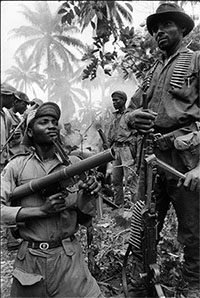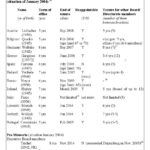The Nigerian-Biafran War
1 Comment May 30 2017 marks the 50th birthday of the declaration of independence of the republic of Biafra, leading up to a 30-month civil war between federal Nigerian troops and the (Igbo) secessionists. On the occasion of this anniversary, the Library, Documentation and Information Department at the African Studies Centre in Leiden (ASCL) has compiled a web dossier on the Nigerian Civil War (1967–1970), also known as the Biafran War.
May 30 2017 marks the 50th birthday of the declaration of independence of the republic of Biafra, leading up to a 30-month civil war between federal Nigerian troops and the (Igbo) secessionists. On the occasion of this anniversary, the Library, Documentation and Information Department at the African Studies Centre in Leiden (ASCL) has compiled a web dossier on the Nigerian Civil War (1967–1970), also known as the Biafran War.
Far from being an exhaustive or even representative overview of the record of scholarship that has appeared on this topic, this dossier is an attempt to highlight different discourses reflected in the ASCL Library’s collection. After the introduction, section 2 presents a selection of publications on the war, ranging from a 1967 propaganda leaflet by the Nigerian government of information (Unity in Diversity) to a 2016 article on ‘the tensions in Nigeria-Biafra war discourses’. A highlight of this section is a collection of student essays on the civil war written in 1971 at the Toro teacher’s college. The cahiers were donated by their teacher, Aart Rietveld. Noteworthy is also the civil war chapters in the textbook series on civics and history for primary schools.
The third section deals with fictional accounts, personal narratives and poetry on the Biafran conflict, illustrating how much more literature there is than the (rightly famous) writings of Ken Saro-Wiwa, Adichie and Achebe.
Sections 4,5 and 6 capture the conflict through the biographical lenses of key actors. Writings by and about the two political protagonists, General Gowon (Nigerian head of state 1966–1975) and General Ojukwu (president of Biafra 1967–1971), give an insight into the federal and Igbo perspectives of the conflict. The third person chosen for this biographical section is the Yoruba nationalist Obafemi Awolowo, who was active as Federal Commissioner for Finance in Gowon’s cabinet during the war. Chinua Achebe portrays Awolowo as the architect of the starvation policy meant to crush the Igbo defence: “It is my impression that Chief Obafemi Awolowo was driven by an overriding ambition for power, for himself in particular and for the advancement of his Yoruba people in general. […] In the Biafran case it meant hatching up a diabolical policy to reduce the numbers of his enemies significantly through starvation […].”(There was a country, p. 233). This view contrasts strongly with the almost hagiographic accounts of “the man of courage , wisdom, reason and vision” (according to Moses Makinde).
The dossier is concluded with a selection of web resources and is introduced by former LeidenASA fellow Jays Julius-Adeoye, who recently published ‘The Nigeria-Biafra war, popular culture and agitation for sovereignty of Biafra nation’ in the ASCL working paper series.
You May Also Like
Comments
One Response to “The Nigerian-Biafran War”
Leave a Reply








March 1st, 2020 @ 9:16 am
I feel know one knows exactly what happened during the war, all sides to the story have not been gotten and if it had been gotten, how are we sure, they are being honest in their tales.